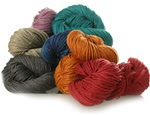 |
| Naturesong Plant-dyed Merino |
I've decided that there is no single answer for me. It's kind of like going on a diet - I'm reducing my environmental impact. I can't go from 0 to 100% in one step. As it turns out, neither can most yarn manufacturers. There are simply too many details, and going fully organic is impossible to do in large volume. Here are some of the details: Is the fiber produced without chemicals, pesticides, in sustainable ways with minimal impact to soil, air, and water? Is it processed on machinery made from sustainable sources? Powered by water, electric, gas, ethanol? How is dyeing handled? Is it vegetable dye? Sustainable? Low impact? Conventional? If it's silk, were the silk worms allowed to become moths, or were they killed when the cocoons were complete? Is the entire process cruelty free? Is the packaging and shipping done in a low-impact way?
Many of the major manufacturers/distributors have come up with eco-friendlier lines to supplement their existing product line. To simply stop producing conventional yarns would put the big manufacturers out of business, as eco is so expensive. Lion Brand, Cascade, Knit Picks, Lana Grossa and Classic Elite have all added eco-friendly and/or organic yarns to their product lines, among a mountain of others. Using these yarns is a step in the right direction. It sends a message to the company that I'm willing to pay a bit more to do better for the environment.
 |
| Allhemp6 Hemp Yarn |
Dyeing is the subject of huge debates now, and it's more complex than you would think. Tiny amounts of conventional dyes will color massive amounts of yarns, and will leave low environmental impact. Massive amounts of natural dyes are required to dye small amounts of yarn (approximately 100 times more by volume than conventional dyes), and have an enormous farming footprint.
How do you choose? I don't have a neat answer. Research your favorite yarns with regard to your particular concerns. If you worry about the treatment of animals, environmental impact, land use, or recycling, those are all things you can discover about most fibers. Jump on company web sites and learn what you can. And if you can't find the answers you're looking for, ask the company. They won't know you care if you never tell them. :)
No comments:
Post a Comment